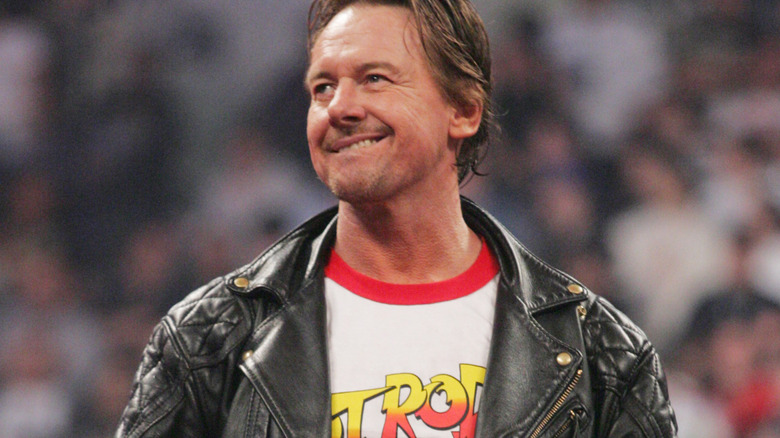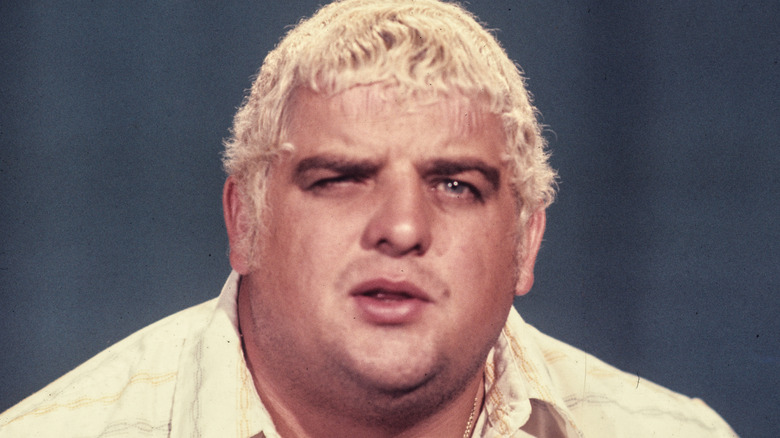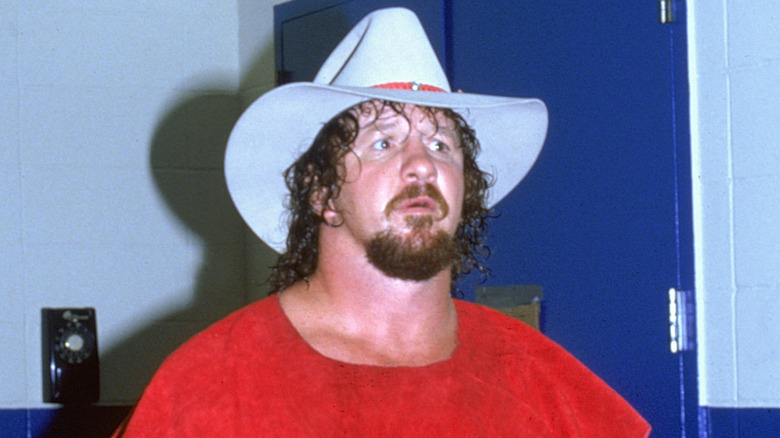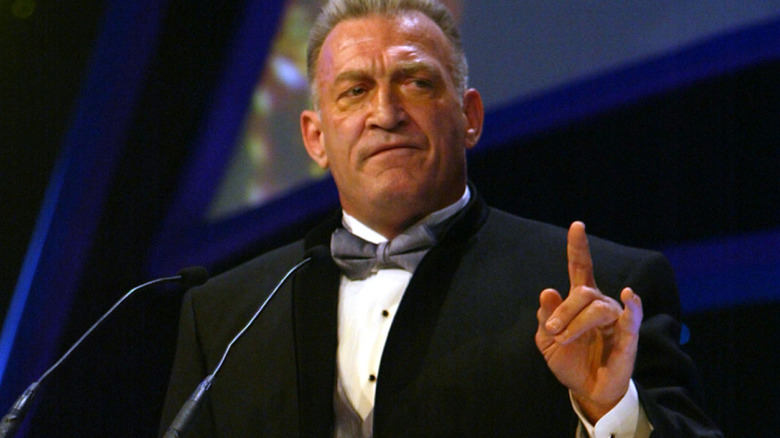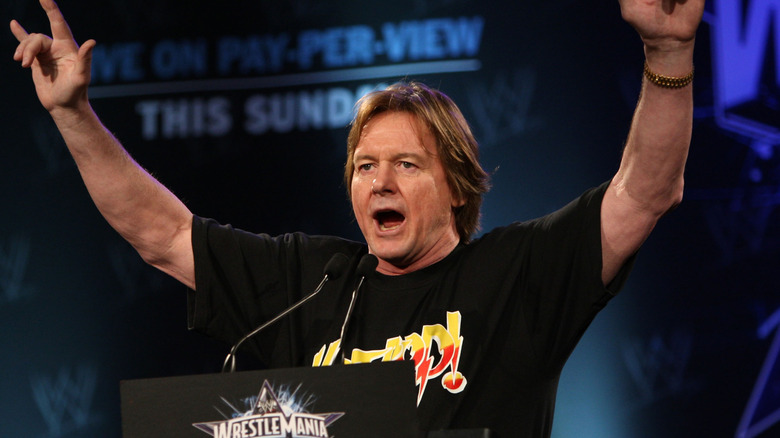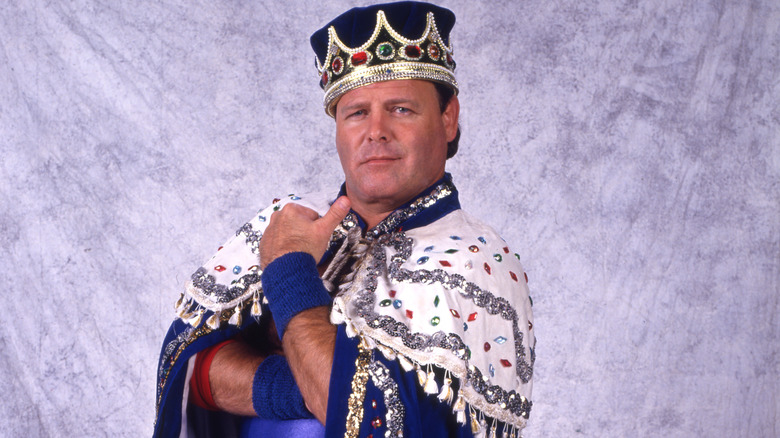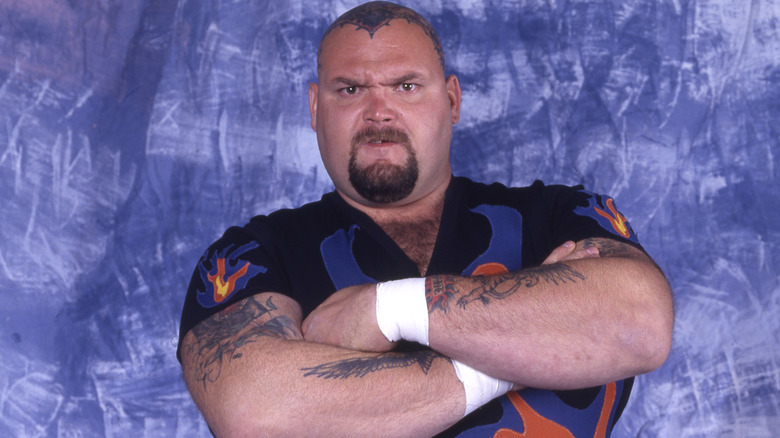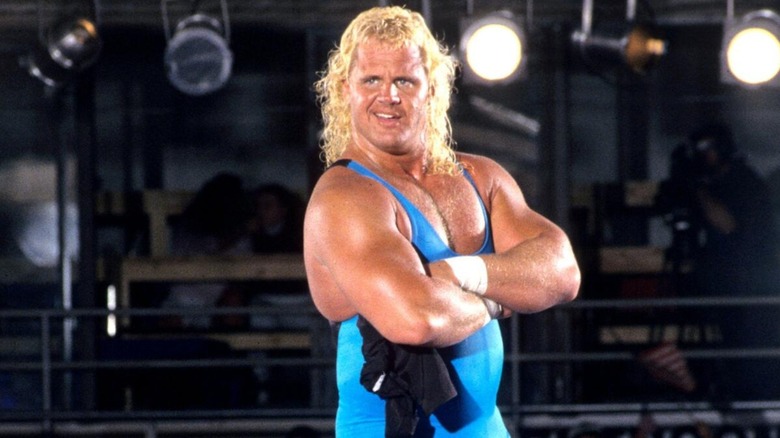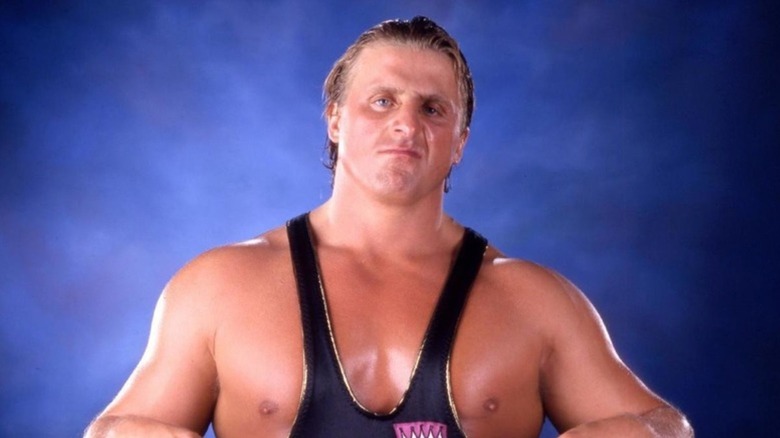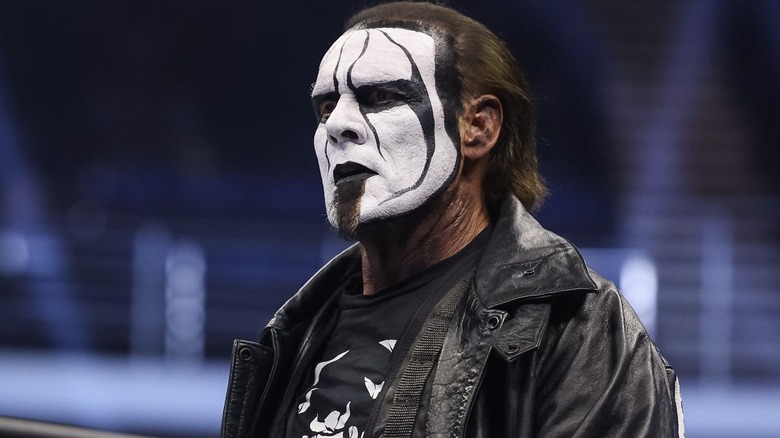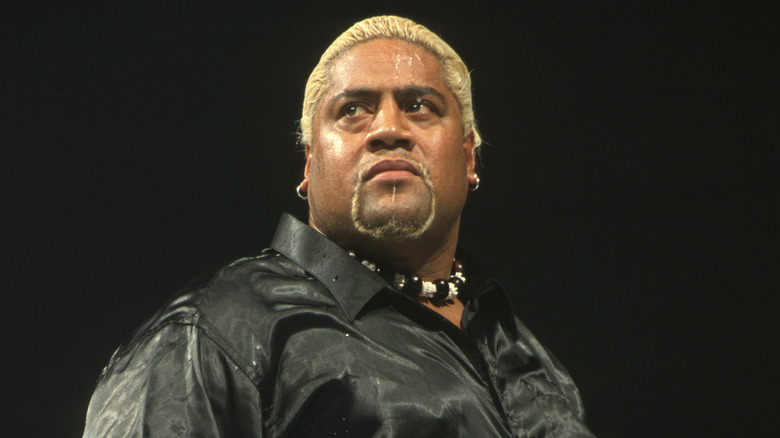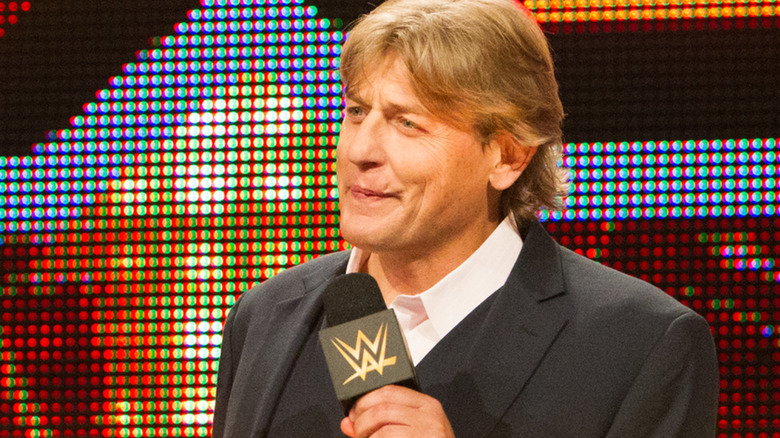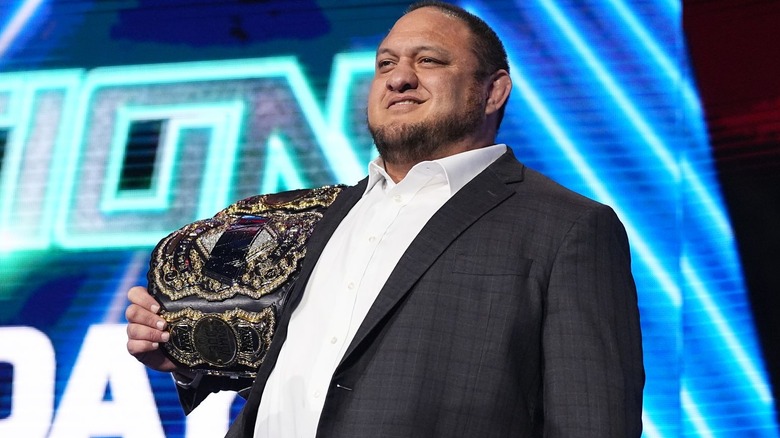Iconic Wrestlers You Won't Believe Never Won A WWE World Title
WWE's top prize has had a lot of different names and even more designs over the 62 years it's been active. Sometimes it's the WWE Championship, other times it's the WWE World Championship, and on certain occasions they'll include the weight class to make everyone aware that the person holding the title is indeed the World Heavyweight Champion. Then the entire universe gets brought into the name to make it feel larger than life, and before you know it, everything becomes undisputed. However, regardless of what it's called, the WWE Championship is the most prestigious title in American wrestling.
Over the years, 69 stars have been recognized as world champions in WWE, with NJPW founder Antonio Inoki and WWE Hall of Famer Ted DiBiase having claims to being the top champion at points in time, but their names aren't in the official history books. This includes the titles that have since been deactivated but were recognized as one of the top prizes in the company, such as the World Heavyweight Championship that was introduced in 2002, and the WWE Universal Championship that was introduced in 2016, but only having 69 men as champion in 62 years means that a lot of big names missed out on being WWE's top guy.
Dusty Rhodes
Given who the current Undisputed WWE Champion is, it's only right that we kick off this list with his father, "The American Dream" Dusty Rhodes.
Despite being one of the most accomplished wrestlers of all time, WWE was never Rhodes' primary promotion. He spent almost all of his active career with the National Wrestling Alliance and the various territories that operated under the NWA umbrella, winning the NWA Worlds Heavyweight Championship on three occasions. After Jim Crockett Promotions was purchased by Ted Turner, it would be rebranded was World Championship Wrestling, and for a full decade until WCW's demise in 2001, Rhodes would call WCW his home as both an in-ring performer, and an on-screen character, but in between all of that, he did have an ill-fated run with WWE.
From 1989 to 1991, Rhodes was a part of the WWE roster, but he was no longer the man NWA and JCP fans had known. He had to adapt to the cartoonish landscape of WWE, and in the process, he went from being one of the biggest draws in all of wrestling, to a dancing fool that was covered in yellow polka dots. WWE remember him as one of the greats, but at the time, they didn't think he was great enough to win the world title.
Terry Funk
Terry Funk wrestled in just about every wrestling promotion that was available to him in his near 50 year career, including the WWE. However, much like Rhodes, Funk made his name and achieved most of his success outside of the WWE bubble.
Adored in his hometown of Amarillo, Texas, Funk's success in wrestling stretched across the entire world. His Western State Sports promotion was under the NWA umbrella in the 1960s and 1970s, which allowed him to become the NWA Worlds Heavyweight Champion in 1975, and travel to All Japan Pro Wrestling with his brother Dory Jr. Much later in his career, he had one of the greatest feuds ever with Ric Flair in WCW, and become synonymous with Extreme Championship Wrestling, winning its world title twice.
So why didn't he win big in WWE? His first run with the company that started in 1985 only lasted for one year as he left due to the grueling schedule, and his second run lasted 18 months, beginning in January 1997 and ending in July 1998. Funk simply didn't enjoy life in WWE the first time around, and was already 52 years old by the time he joined the company for a second time.
Paul Orndorff
You would think that the man who was one quarter of the very first WrestleMania main event would have had a run with the WWE World Championship, but that wasn't the case for "Mr. Wonderful" Paul Orndorff. In fact, not only did Orndorff never win a world title in WWE, he never won a world title at any point in his career.
Unlike Rhodes and Funk, Orndorff did have a long and noteworthy tenure with WWE. He was in the aforementioned main event of the first-ever WrestleMania in 1985, had an extensive feud with Hulk Hogan during the peak of "Hulkamania," and was routinely featured as one of WWE's top stars during one of its hottest periods. However, that period was as hot as it was because of the man Orndorff spent most of his time feuding with.
To put it simply, it was almost impossible to find a reason to take the championship away from Hogan in the 1980s. He was the biggest draw in the entire business at the time, hence why WWE kept the title on him for over four years between 1984 and 1988, right around the time that Orndorff was in his physical prime. By the time Hogan dropped the title, Orndorff was already on his way out of the company due to several injuries.
Roddy Piper
Like Orndorff, Roddy Piper was one quarter of the first WrestleMania main event, feuded extensively with Hulk Hogan, and was a megastar at a time when wrestling was a pop culture phenomenon. What separates Piper from Orndorff is how decorated he was both in and out of the ring.
Breaking through at the tail end of the 1960s, Piper hopped from territory to territory and made a huge name for himself along the way. Whether it was in Portland, Mid-Atlantic, or Jim Crockett Promotions, Piper had become one of the rowdiest and most sought after commodities around by the mid-1980s. He began working for WWE in 1984 and would be with the company for 12 years on and off, but for some reason never broke through to being a WWE World Champion despite his immense popularity.
He was routinely featured as a star attraction, and would even get a run with the WWE Intercontinental Championship, but much like Orndorff, by the time WWE decided to take the title off Hogan, Piper had been wrestling for nearly 20 years and WWE wanted to usher in a new era with fresh young stars like Bret Hart and Shawn Michaels, making Piper something of a gatekeeper in the process.
Jerry Lawler
There are at least two generations of wrestling fans at this point who only know Jerry "The King" Lawler as a color commentator. The crown, the partnership with Jim Ross, the constant need for "puppies" and the urge to randomly go "AHHH" whenever something shocking happens, that is what Lawler is known for today, but in his prime, he was one of the greatest heels the wrestling business had ever seen.
For 22 years, Lawler travelled to nearly every territory there was in the United States, all while calling Memphis his home. In the AWA in particular, he won the Southern Heavyweight Championship over 50 times, while also capturing the AWA World Heavyweight Championship in 1988, something that he would also achieve in places like the CWA and USWA in Tennessee and Fritz Von Erich's WCWA (formerly WCCW) in Texas.
When Lawler joined WWE in 1992, he was only semi-active in the ring. When he wasn't at the commentary table, he was still feuding with the likes of Jake "The Snake" Roberts, Bret Hart, and Doink The Clown. Lawler spent the next 32 years of his life watching other people win the WWE World Championship with a headset on instead of his singlet.
Bam Bam Bigelow
Often regarded as one of the most gifted big men in the history of wrestling, Bam Bam Bigelow's legacy has only grown in recent years. Thanks to footage from the past being so accessible to modern fans, people have been able to watch Bigelow move like a cruiserweight on his Japanese tours, while also being able to enjoy his work for WWE, WCW, and ECW.
Bigelow was a behemoth of a human being who was in WWE for two very different eras. He is often forgotten part of WWE's midcard during the 1980s primarily due to not being featured in a main event capacity and his frequent trips of Japan being more important to him, and he would return to the company in 1992 to be part of the earliest stages of WWE's "New Generation" era. WWE clearly saw something in Bigelow during his second run as he was tasked with making Lawrence Taylor look good in the ring when the two men clashed in the main event of WrestleMania 11.
However, that WrestleMania main event would be as good as it got for Bigelow as he would leave WWE at the end of 1995. He would spend a lengthy period of time with ECW before jumping ship to WCW. Because Bigelow decided to run out the rest of his Time Warner contract, he got paid for doing nothing until the summer of 2002.
Mr. Perfect
Curt Hennig was already a former AWA World Heavyweight Champion by the time he got to WWE in 1988, and as Mr. Perfect, it looked like forgone conclusion that he would eventually wind up with the WWE Championship around his waist at some point.
He was pushed to the top of the card towards the start of the 1990s, and established himself as one of the great workhorses of his day by winning the WWE Intercontinental Championship on two occasions. Perfect's matches with the likes of Tito Santana and Bret Hart are still cited as matches that got people into wrestling, and proved that you didn't need to be seven feet tall in order to steal the show in Vince McMahon's land of the giants.
What really stunted Perfect's quest for a world title in WWE was injuries. He was briefly retired in 1991 due to having a number of herniated discs in his back, and a broken tailbone, but would eventually return to action by the end of 1992. However, the damage was done. Perfect would then have two more lengthy sabbaticals from wrestling to nurse his nagging injuries, before transitioning into a commentary role, the ultimate sign that your time as a full-time wrestler in WWE was over. Perfect left to join WCW in 1997, and despite a brief return in 2002, Perfect was past his peak, and tragically died in 2003 without ever holding WWE's top prize.
Owen Hart
A wrestler so beloved that one of All Elite Wrestling's biggest tournaments of the year is named after him and the charity set up in his name.
Quite simply, Owen Hart is one of the most influential wrestlers of his generation. His in-ring IQ was so high that many people called him a genius while working with him, and that can be attributed to the path he took to the WWE in his formative years in the business. After training in his family's dungeon, Owen made a name for himself in Stampede Wrestling, before travelling to New Japan Pro Wrestling where he became the first non-Japanese wrestler to win the IWGP Junior Heavyweight Championship.
With his brother Bret, and his brothers-in-law Jim Neidhart and the British Bulldog already in WWE by 1991, it was only a matter of time before Owen joined the rest of his family, and immediately established himself as one of the best workers on the roster. His WWE Championship feud with Bret in 1994 is one of the best feuds in company history, and even though he couldn't win the big one, he did win everything else, including three Slammy Awards which he was very happy to gloat about.
Due to the treatment Bret received during the Montreal Screwjob, Owen did want to leave WWE in 1997, but stayed to portray a more family friendly character, the Blue Blazer. However, his career and life would come to tragic end at the Over The Edge pay-per-view in May 1999 as Owen would die after falling from the ceiling of the Kemper Arena while preparing for his entrance.
Sting
It shouldn't really be a surprise that a man synonymous with WCW never got the chance to hold WWE's biggest title, but given the career that Sting had, he really should have had a run with the WWE World Championship, even if it was just for a cup of coffee.
"The Icon" is one of the very few wrestlers who managed to not only be beloved throughout his career, but managed to evolve with the times and be a massive help to whichever company he was in at the time. Whether it was the NWA, WCW, TNA, or AEW, Sting was always one of the most popular men on the roster, something that is incredibly difficult to do across a 39-year career. In those 39 years, he won world championships in nearly every company he worked for aside from AEW, but he did win the AEW Tag Team Championships in the final weeks of his career with Darby Allin, culminating a three-year undefeated streak in the tag team division.
Had Sting joined WWE earlier than he did, there is every chance he would have won the WWE Championship. He had positive negotiations in 2003 that never amounted to anything, he was extremely close to being The Undertaker's opponent at WrestleMania 27 in 2011, but by the time he did join WWE in late 2014, the world title was once again being used to elevate younger talent like Seth Rollins. Sting would challenge Rollins for the title at Night of Champions 2015, but that match ended with "The Icon" suffering an injury that would keep him on the shelf for nearly six years.
Rikishi
The Anoa'i family is one of the most decorated families in the history of wrestling, and boasts two of the most famous professional wrestlers of all time in the Rock and Roman Reigns, but not every member of the family could reach the heights of "The Final Boss" or "The Tribal Chief."
Before landing on the Rikishi name in 1999, Solofa Fatu Jr. had many names and gimmicks in WWE. He was one half of The Headshrinkers as Headshrinker Fatu, then he was "Make a Difference" Fatu, and then he was the Sultan before initially being let go from the company in 1998. Fatu would travel the independent circuit to rebuild his image, and would be rehired by WWE in 1999 and took the name everyone knows now, Rikishi. Initially, he was paired with Too Cool and were a very popular babyface team, but as 2000 rolled on, Rikishi would be pushed towards the main event scene in an era where wrestling was more popular than ever.
Rikishi was rubbing shoulders with Triple H, Steve Austin, The Undertaker, Kurt Angle, and his family member The Rock at the peak of the Attitude Era. He was even the man who admitted to running over Austin for The Rock at the behest of Triple H. However, unlike all of those names previously mentioned, Rikishi never won the WWE Championship.
William Regal
Thanks to the wrestling industry shifting towards a style that is focused more on work rate, someone like William Regal who never truly got the credit that he deserved during his career has finally been given his flowers over the past decade.
One of the most famous wrestlers to ever come out of the United Kingdom, Regal originally made his name in WCW as Lord Steven Regal, but was fired in 1998 after a controversial match with Goldberg where Regal reportedly roughed up the then rookie monster. He would then have a brief stint in WWE that came to an abrupt end due to Regal's personal demons getting the better of him, and after making a return to WCW, he was back in WWE by the end of 2000 at the peak of the Attitude Era.
Regal's in-ring IQ, as well as his willingness to basically do whatever he was told to, he was respected by virtually everyone in WWE, and by the end of the Ruthless Aggression era he was actually meant to have a big main event push that would lead to a world title run, but it never happened. Regal got himself suspended for 60 days shortly after winning the 2008 King of the Ring tournament, and when he returned, he was never trusted with a main event spot ever again.
Samoa Joe
Since the turn of the millennium, few men have been more feared or respected than Samoa Joe. Whenever the question of who the greatest wrestler of the 21st century is brought up, you will hear more than a smattering of mentions for the "Samoan Submission Machine" as he has dominated companies all over the country since his debut. He is the longest-reigning ROH World Champion, longest-reigning ROH World Television Champion, and a former TNA and AEW World Champion who can genuinely make the claim of having the single greatest year that any wrestler has had with the body of work he put together in 2005.
Joe debuted for WWE in 2015, and it's not like the company saw him as someone who was too old to be in the main event scene as he won the NXT Championship twice, the WWE United States Championship twice, and was involved in high-profile world championship feuds with both Brock Lesnar and AJ Styles. However, WWE never pulled the trigger on Joe, and after he broke his thumb in 2019, he followed in the footsteps of Jerry Lawler and Mr. Perfect by transitioning into commentary before being released not once, but twice in the space of 12 months. The WWE Championship is the one prize that alluded Joe, but given his recent success in AEW, not being the WWE Champion probably isn't something he loses sleep over.
